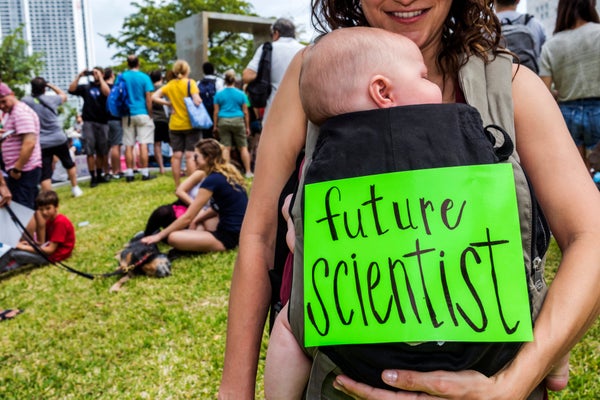This article was published in Scientific American’s former blog network and reflects the views of the author, not necessarily those of Scientific American
More than 11,000 scientists recently urged swifter action on climate change, but polls show that 16 percent of the U.S. public continues to deny that climate change is real, and 63 percent of Americans rarely or never discuss global warming with their peers. A rigorous Danish study recently demonstrated the overwhelming safety of vaccines while documenting recurrent threats from measles and other preventable diseases globally. Yet the “anti-vaxxer” movement remains strong.
When misunderstanding of science and a willingness to believe scientific misinformation affects not only individual welfare, but also key government policies that affect everyone, a new systemic educational approach is needed. We need to do a better job of teaching everyone to be “science citizens.”
Science citizens should be able to apply scientific reasoning and critical thinking to inform their personal decisions, and to navigate the frenzy of modern news cycles. They should be equipped to use and analyze scientific information to make informed choices at the ballot box and to participate effectively in government decisions about environmental policy, health care and a wide range of other issues. Science citizens should also have an innate understanding of and trust in the institution of science. We do not mean that citizens should blindly believe anything labeled as science. Rather, they should understand that science is a rational and evidence-based schema for understanding the world, and that scientific institutions hold their members to rigorous standards of care and honesty in their work.
On supporting science journalism
If you're enjoying this article, consider supporting our award-winning journalism by subscribing. By purchasing a subscription you are helping to ensure the future of impactful stories about the discoveries and ideas shaping our world today.
In calling for science citizens, we do not mean the same thing as “citizen scientists.” Citizen scientists help researchers collect data, and therefore are an important part of science’s human infrastructure. While citizen science contributes to a more scientifically literate population, science citizenship should extend to those with no interest in engaging directly in scientific research.
Rather, we use the term science citizens to articulate the goal of educating as many average citizens as possible to be skilled at consuming scientific information, forming rational opinions based on that information, and using and analyzing it to help support and inform critical government policy decisions. To be clear, these skills will not cause every informed citizen to reach the same conclusion on controversial issues. Policy often involves the complex interaction of science with law, economics, ethics and other value-laden factors on which reasonable minds can differ. Nuclear physicist Alvin Weinberg referred to this as “trans-science." We simply hope that science citizens will understand the underlying science in a more sophisticated way in reaching opinions that may still vary based on personal values and perspectives.
The fast-paced, often hyperbolic modern news cycle prevents citizens from developing deeper understandings of scientific issues. It also reduces opportunities for scientists and science communicators to present information in greater depth. Though many scientific findings can be diluted to catchy headlines and 280-character synopses, such simplistic summaries deprive consumers of a thorough understanding of scientific research and its implications. A more scientifically literate, critically thinking population might alter these media patterns in future decades by insisting on more thorough science journalism. Science citizens would be better prepared to research subjects independently and develop better informed and more nuanced opinions about a range of matters, from public policy to personal health, regardless of how such topics are portrayed in quick media hits.
To educate a population of science citizens, science education must improve at all levels. Although the recent focus on STEM education demonstrates that the American education system is working toward improved science literacy, we miss the mark by targeting only students destined for careers in science and education. Science education should foster and encourage critical thinking skills in all students, starting at an early age. “Science citizen” curricula would prioritize the application of scientific thinking to “real-world” scenarios in lieu of rote memorization, and emphasize experimental design, hands-on experience with rigorous data analysis, critical thinking and an understanding of scientific ethics.
Given past failures in science education, however, efforts should not be limited to current schoolchildren and future generations. We also need to develop and improve continuing education initiatives for non–school-aged citizens and utilize public campaigns to improve widespread science literacy. Particularly given the disproportionate impacts of climate change and other environmental degradation, efforts to create science citizens should also prioritize programming in underprivileged and highly impacted communities. We should offer science education opportunities for all citizens, regardless of circumstance.
Experts believe that improved civic education will mitigate increasing dysfunctionality in our government. For example, if average citizens do not understand the essential role of courts in reviewing the constitutionality of federal statutes or the legality of executive branch actions, they cannot understand why assaults on an independent judiciary are so dangerous to our democracy. Law is too important to be left to lawyers alone.
And science is too important to be left to scientists alone. Just as we need to reinvigorate civic education to help restore democratic governance, we need to ensure that everyone receives sufficient training in scientific reasoning and analysis to participate effectively in the increasing array of important societal decisions involving science. A population of science citizens is one that can thrive, both communally and individually, through evidence-driven and value-inclusive progress.
